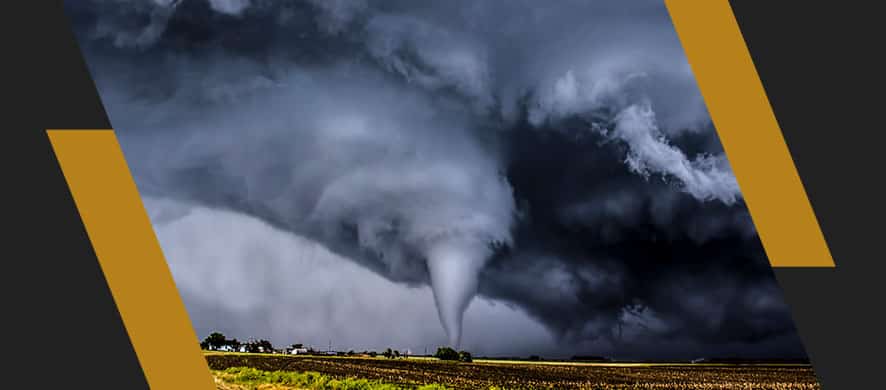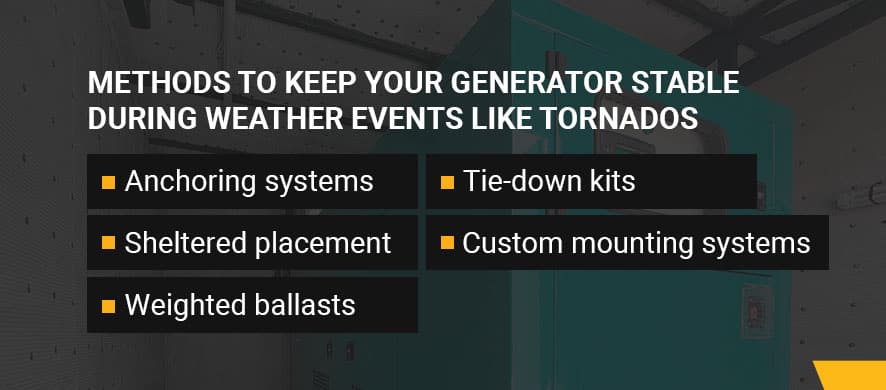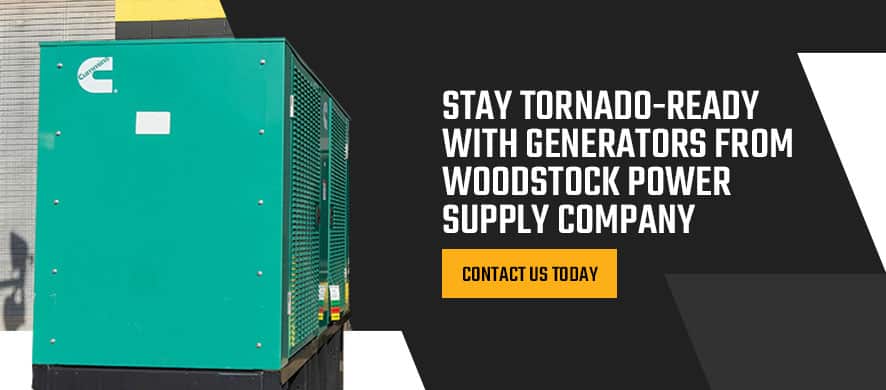How to Protect Your Generator From a Tornado

With 1,200 tornadoes happening in the U.S. every year, you need to know how to protect your generators to keep your operation safe during harsh weather. Preventing generator damage during tornadoes is critical for protecting your systems when bad weather strikes. You can ensure your generator is secured against wind and weather with the proper safety measures. Use these tips to help protect your commercial generator from tornadoes so you can keep the lights on.
Understanding Commercial and Tow-Behind Generators
Spring in the south and central U.S. means it’s time to prep for tornadoes. When tornadoes hit, they can pull up powerlines, trees and debris, causing outages that impact your operation. Investing in a generator before the next tornado can ensure you have a backup plan when these disasters touch down.
Commercial operations rely on generators to keep everything running smoothly. The right generators can help protect your business during extreme weather, ensuring minimal downtime. Both commercial and tow-behind generators help power your operation, giving your essential components the power they need. Understanding these two generators will help you with emergency preparedness for tornadoes, protecting your operation from power-related problems.
Commercial Generators
Commercial generators keep industrial operations and businesses running. These generators are designed to hold up to heavy use and can provide power during outages. They’re usually powered by diesel or natural gas, so they can keep working during an electrical outage. These generators offer a high wattage output, ensuring they can easily handle the heavy demands of large facilities. Their versatility makes commercial generators valuable for powering hospitals, factories and offices.
Tow-Behind Generators
Tow-behind generators are a portable backup power solution for commercial operations. They’re called “tow-behind” because you can pull them behind vehicles for a flexible power source. Tow-behind generators are usually smaller than commercial generators but larger than portable generators. Their portable size and power capabilities make them ideal for outdoor events, construction sites and emergencies for smaller operations. Use these generators for a quick and easy portable power setup.
Tornado Damage and Generators
Tornadoes are severe weather events that can cause significant damage to your generators, leaving you without power when your operation needs it most. Tornadoes hit suddenly and hard — with high winds, destructive hail and damaging debris, they can threaten your generators and facility. After a tornado swings through the area, power outages are expected. A commercial or tow-behind generator is essential for helping your operation recover once a tornado comes through.
These generators can sustain your essential operations, preventing further financial losses during recovery. Whether you need a generator to power emergency services, support communication or prevent production losses, you can keep everything afloat with a backup power source. Having something that can provide a stable power supply is invaluable when a tornado or other power emergency happens.
How to Protect Commercial Generators From Tornadoes
Once your generator is installed, you need to protect it from tornadoes. With high winds, hail and rain coming down heavily, your generator might fail when you need it most. Careful maintenance and protection will go a long way towards keeping your generator safe during severe weather. Use these strategies to help keep your generator secure, dry and running smoothly.
Securing the Generator
Securing your generator is essential in tornado-prone areas. Recent tornadoes in northeast Kansas had wind speeds that hit 120 mph. While commercial generators are decently heavy, tornadoes can pickup substantial objects, throwing them around and causing more damage. If you live in a tornado-prone area, you need to prep your generator for extremely powerful winds. Use these methods to keep your generator stable during weather events like tornadoes:

- Anchoring systems: Use bolts to fasten your generator to a concrete foundation securely. You can also anchor the generator with ground anchors or straps to help prevent it from lifting in high winds.
- Sheltered placement: Use enclosures to help shelter the generator from direct wind exposure. Getting a generator enclosure for wind protection can help significantly. You can cover your generator while following safety regulations to help protect it from debris and wind damage.
- Weighted ballasts: Ballast bags and concrete blocks can weigh down the generator to help keep it stable during severe weather.
- Tie-down kits: Look for commercial tie-down kits designed for commercial generators, which tie your equipment down and keep it secured during high winds.
- Custom mounting systems: You can also create custom mounting systems based on your generator to help secure it. A custom fit will precisely match your generator, ensuring it’s held in place.
Weatherproofing the Generator
Weatherproofing the generator adds an extra layer of defense. Spring brings a wave of severe thunderstorms and the perfect conditions for tornado formation. If you’re facing potential tornadoes, you have to be ready for ping-pong-sized hail and other serious weather effects.
Debris and hail can beat down on your generator, causing extensive damage and risking your power source. Use weather-resistant covers or debris-resistant generator enclosures to protect your generator from the elements. Rain, hail, debris and wind can all interfere with the generator’s effectiveness and your operation. Ensure your generator cover or enclosure is securely fashioned to prevent wind damage. Additionally, seal electrical connections and outlets to prevent water from getting in and protect the internal mechanisms.
You should also weatherproof your generator by regularly inspecting and replacing weatherproofing measures as needed. Inspect everything thoroughly after severe weather events to ensure everything is safe and in good condition. The better condition your protective measures are in, the safer your generator will be.
Preparing the Generator
As we move into warmer weather, you need to be on the lookout for sudden tornado appearances. The recent severe weather conditions in the central and southern U.S. led to 20 tornadoes forming. If you want to avoid tornado damage, you need to be strategic about your generator protection.
- Avoid windows: Tornadoes can rip through the ground, tearing up trees and sending debris into your windows and building. Keep your generator away from any windows, trees, structures and fences. You want to avoid debris and wind damage to the generator from nearby objects and glass.
- Elevate your equipment: Install your generator on a raised platform to keep it away from water. Tornadoes come with rain and ripping power — this combination can create flooding around your generator. If it’s on the ground, water could quickly compromise it. An elevated platform helps keep your generator away from tornado-related flooding.
- Install remote shutdowns: Make sure you get a generator with remote shutdown capabilities. If you’re on the tornado’s path, shutting down the generator can help prevent power issues. With remote shutdown, you can quickly power off your generator from anywhere. You’ll save time during your emergency procedures while keeping your generator safe.
Maintaining the Generator
When you’re just getting into tornado season, some generator maintenance is an excellent idea. Maintenance lets you check on your generator, getting it in top condition before you need it most. Regular generator maintenance is essential for generator reliability — you want to avoid a generator issue when you’re dealing with tornado cleanup.
If you want your generator to work after a tornado, you have to maintain it. Follow your manufacturer’s inspection guidelines, checking over all the components for wear, rust and damage. A well-maintained generator will have fewer problems, protecting you from mechanical failure when needed. Your regular generator maintenance should include:
- Checking fuel levels
- Inspecting oil quality
- Monitoring coolant levels
- Cleaning filters and spark plugs
- Clearing debris
- Replacing worn-out parts
The Importance of Using Backup Power Supplies
If a tornado does happen near you, having a reliable backup power supply is critical. The right backup power supply can mean the difference between a temporary outage and significant downtime. Different backup power supplies are suited to different operations, so make sure you pick the backup that works with your needs. Explore your power outage solutions with backup power supply options like:
- Uninterruptible Power Supply (UPS) systems: UPS systems provide short-term power during short power outages through batteries. They also let you seamlessly transition between your generator and main power once everything is restored.
- Dual-power sources: Dual-power sources combine generators with UPS systems. You get a more comprehensive protection that gives you power for short-term and extended outages.
- Standby generators: Standby generators automatically start when you lose your main power supply. They’ll give you continuous power until your main supply comes back on.

Stay Tornado-Ready With the Woodstock power company experience
Whether you’re looking for a temporary backup solution or a long-term power supply, Woodstock Power has the industrial and commercial generators you need to keep everything up and running. If you want to buy, sell or lease an industrial or commercial generator, we’re here to help.
Operating globally and headquartered in Philadelphia, Pennsylvania, we have industry experts who focus on commercial generator sets, with in-depth industry knowledge to help you choose the right generator that fits your needs.
We are industry leaders in buying and selling used generators to fit the needs of many businesses, including commercial, industrial, medical, agricultural, and university. This includes facilities like hospitals, better living centers, nursing home, airports, hotels, resorts, restaurants, retail centers, manufacturing, production, and more.
Our experts are ready to assist you from answering any questions you may have about power generator sets to helping you find the best selection in our inventory based on:
- Peak & Average Power Requirements
- Fuel Preference (Natural Gas or Diesel)
- Portability & Stationary Power
- Prime & Standby Generator Requirements
- Available Space & Exhaust Restrictions
We carry only the most top rated new, used, and surplus power generator sets for sale, providing you with a great value generator that will fit your budget.
Our generators have been thoroughly inspected, serviced, and verified, which ensures that you will be buying a quality generator that you can depend on. If a generator is not up to par with industry standards, we make all necessary repairs or modifications, and fully test every generator before we sell. This ensures a full turnkey generator that’s ready to fire up and go!
Due to our wide selection of generator sets, we’re confident that we can find the model that best suits your operational needs and budget.
We also buy used generators in good quality, if you have already upgraded and you’re looking to sell your older model.
Feel free to contact us with any questions, concerns, or inquiries to learn more about the Woodstock Power Company experience and the quality level of products & services we provide.

